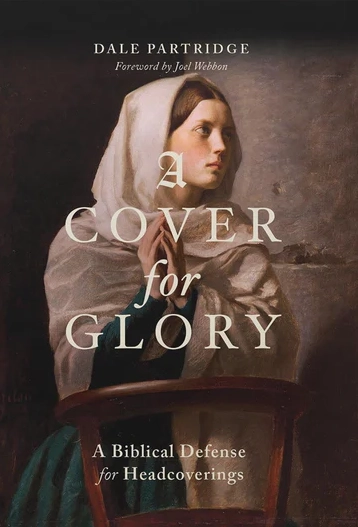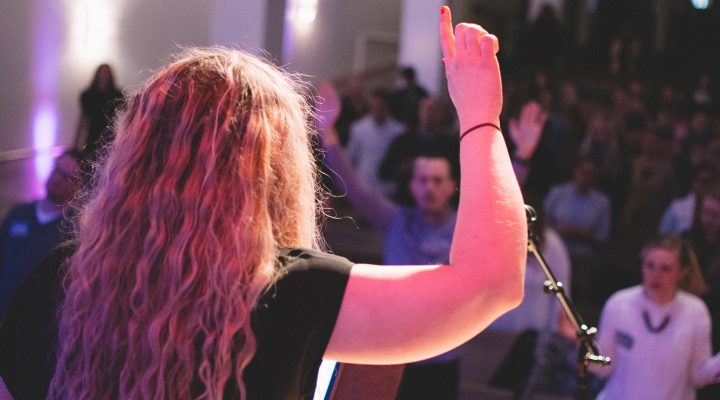It may not be enough to keep women from preaching in church. They’re likely a danger leading music as well, according to an advocate for strict male leadership.
On Feb. 27, Dale Partridge, president of Relearn.org and founder of Reformation Seminary, tweeted this:
The Bible: “Women should not take authority over men in the church.”

Dale Partridge
Churches: “Let’s have a woman worship leader!”
The truth is, a church learns much of its doctrine by what it sings, and if a woman can direct the church in worship, she certainly has authority over the men.
That tweet garnered 80,000 views in less than 24 hours and drew a long string of comments, including those agreeing with Partridge and those skewering him.
Some said they would go even further than keeping women from leading singing.
“Under my leadership, women on my team occasionally sing the melody line while I harmonize. It should be clear that I’m directing. If not, there’s a problem.”
Paul Trotter, a musician from Princeton, Ill., replied — apparently not in jest: “As a worship leader, I hold the responsibility of making sure the songs we sing are in accordance with biblical principles. Under my leadership, women on my team occasionally sing the melody line while I harmonize. It should be clear that I’m directing. If not, there’s a problem.”
That, too, drew a string of comments.
While these tweets may appear out of left field to average Christians in typical churches, they appear mainstream for those who live in the most conservative sectors of American evangelicalism.
 Partridge is an advocate of strict gender roles in church and home. His organization, Relearn.org, bills itself as a ministry to “strengthen biblical literacy in the church.” He is the author of a book titled The Manliness of Christ and another titled A Cover for Glory: A Biblical Defense for Headcoverings. He also has published a children’s book titled Jesus and My Gender designed to teach young children that gender is fixed by God and cannot be changed.
Partridge is an advocate of strict gender roles in church and home. His organization, Relearn.org, bills itself as a ministry to “strengthen biblical literacy in the church.” He is the author of a book titled The Manliness of Christ and another titled A Cover for Glory: A Biblical Defense for Headcoverings. He also has published a children’s book titled Jesus and My Gender designed to teach young children that gender is fixed by God and cannot be changed.
Reformation Seminary advertises itself as offering “a one-year diploma program designed to prepare men to exegete, preach, shepherd and plant a biblical house church.”
Partridge’s tweet on women as worship leaders is not an isolated expression.
Partridge’s tweet on women as worship leaders is not an isolated expression. The Council on Biblical Manhood and Womanhood, which also teaches a strict form of gender hierarchy as biblical, has addressed the question on its website.
An article titled “Can A Woman Lead Worship?” written by Bob Kauflin is offered in response to what the group says are “many questions about the role of women as worship leaders in the local church.”
This article was published in 2007, long before the current debate in the Southern Baptist Convention about the role of women in church leadership. The SBC recently kicked out five churches — including the denomination’s largest and best-known church — for ordaining women as pastors. That has led to an intensive discussion of what roles should be called “pastor” and where to draw the line on women in leadership.
The person leading music in a Christian worship service usually is the second most-visible person in the room, second only to the pastor who preaches. While no statistics are available on how many churches employ women as worship leaders, the topic produces millions of hits on a Google search.
Even among biblical conservatives, opinions are diverse.
Even among biblical conservatives, opinions are diverse. Often, the question gets reshaped by asking what the role of the worship leader is, how much authority that person has and how much control they exercise over the planning of worship.
Strict complementarians, such as those involved in the Council on Biblical Manhood and Womanhood, often come down on the side of excluding women from worship leadership because of the importance of the role.
For example, Scott Aniol, writing for the conservative G3 website, concludes this: “What do we call a person who shepherds and exercises oversight over the church of Christ? We call that person an elder. What is clear when we recognize the ‘building up’ significance of corporate worship is that planning and leadership within the context of a church’s corporate worship is a pastoral teaching function. Therefore, the leadership of a church’s worship, including the planning of services and leadership within the service, ought to be performed by God-called, spiritually qualified elders. Biblical worship is led by the Great Shepherd and his under-shepherds.”
And in a Calvinist, complementarian worldview, “elder” means men only.
Related articles:
Southern Baptist Convention ousts its largest church, Saddleback, for having a woman pastor
As church staff roles evolve, the SBC is forced to define the word ‘pastor’


